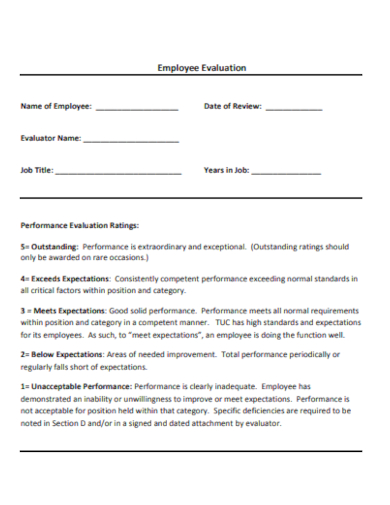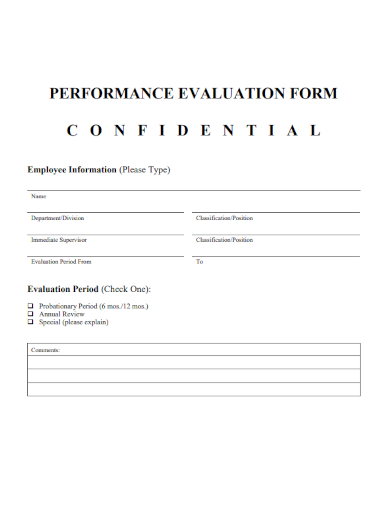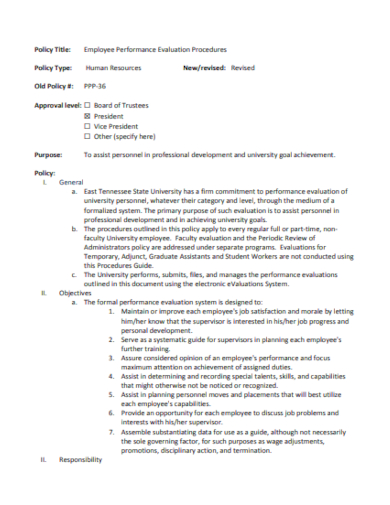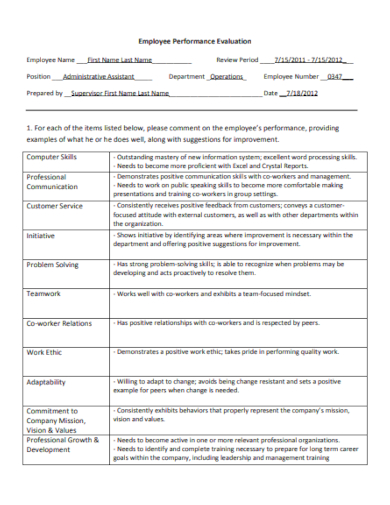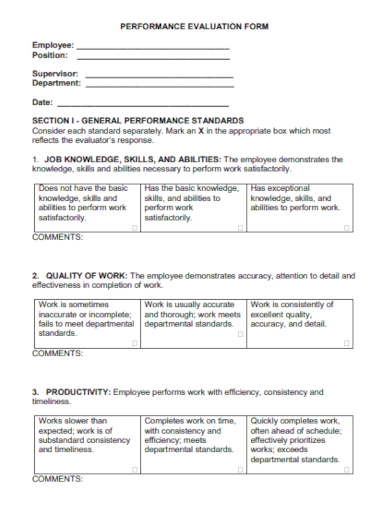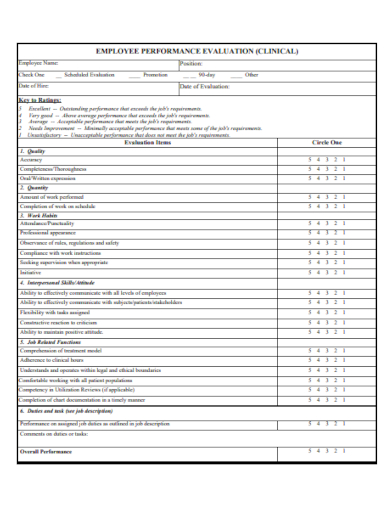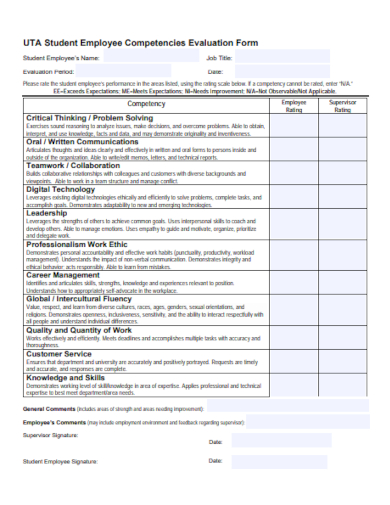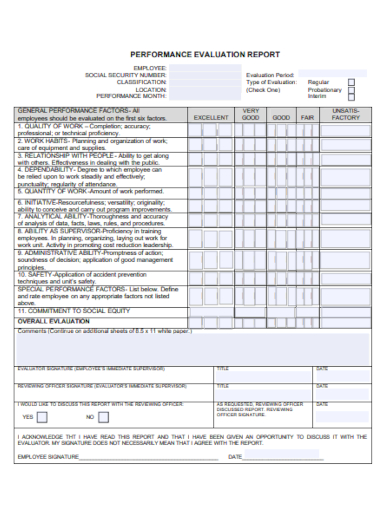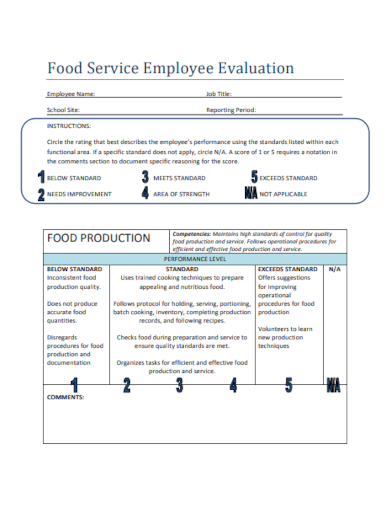Traditionally, employee evaluation sheets have taken the form of formal sessions in a private work area or office and are attended by the employee being evaluated and their boss. Changing the time leads to improvements in both the process and the results. Companies that switch to more frequent evaluations will find it easier to accomplish their project scope management with shorter informal discussions that update recent business developments rather than reconstructing an entire year. This is because frequent feedback evaluations provide more opportunities for employees to provide feedback. This enables business managers to immediately recognize and reward people for their most recent achievements, which helps managers tackle little problems before they become more significant problems.
10+ Samples for Employee Evaluation
1. Restaurant Employee Performance Evaluation Form Template
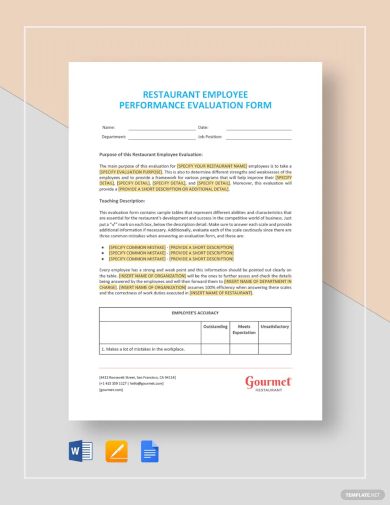
2. Staff Employee Self-Evaluation Template
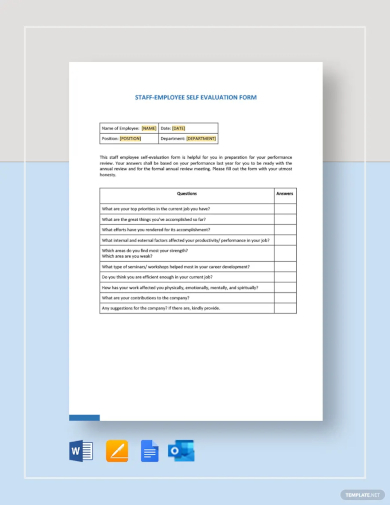
3. Standard Employee Evaluations
4. Employee Evaluation Period Form
5. Employee Performance Evaluation Procedures
6. Sample Employee Performance Evaluation
7. Employee Position Evaluation
8. Clinical Employee Evaluation
9. Student Competency Employee Evaluation
10. Employee Performance Evaluation Report
11. Food Service Employee Evaluation
What Is an Employee Evaluation?
An employee evaluation is a tool that company businesses use to provide workers with feedback on how well they are performing their jobs and formally document that performance. While individual businesses choose their cycles for employee performance reviews, most companies perform their worker’s annual evaluations. When employees approach the conclusion of the initial probationary evaluation period that they have been required to serve for some companies, the company may additionally perform evaluations. Those individuals who perform well on such examination are often removed from the probationary state that they were previously in about their employment. The evaluation information is kept in the employee’s data entry, where it can be accessed at any time by the employee, potential future employers, or educational institutions.
How To Make an Employee Evaluation?
It is essential to carefully consider the process of preparing for a performance review because of the potential advantages and long-term ramifications it may have. Before your subsequent performance review, make sure you follow these steps:
1. Manage Performance Details
You should compile information that is comparable to what your employer will likely present to support evaluation ratings, as it is likely that they may bring documentation or notes. Work samples, previous evaluations, feedback from satisfied customers, and/or a list of objective successes may be included here.
2. Draft Goals
You can better prepare for your performance review by considering what you want to get out of the meeting and what you want to accomplish in the future year by thinking about the goals you have set for yourself. Think about how your company can also support you in achieving these objectives.
3. Create a List of Inquiries
An evaluation meeting allows you to answer any outstanding questions about the firm, your department, or your function. Since your employer should give you their entire attention throughout the discussion, this is the ideal time to do so.
4. Prepare Two-way Conversation
The vast majority of individuals approach performance evaluations with a great deal of nervousness and expectation over the kind of criticism they will receive. It would help if you remembered that an evaluation is a conversation in which both parties have a part to play. Performance evaluations often contain at least some input regarding potential development areas.
What is the purpose of evaluating a worker’s performance?
When evaluating employees, your primary objective should be to encourage a high degree of quality and quantity in the work that the employee produces.
What are the three goals that should be accomplished through employee evaluation?
An evaluation of an employee’s performance has three primary purposes: first, to supply sufficient feedback; second, to supply a foundation for altering or changing behavior; and third, to supply managers with statistics.
When is it appropriate to do an evaluation?
Evaluation needs to occur at set intervals during the duration of a project in order to provide an accurate picture of its progress and impact.
Evaluations of staff members have always served as an essential tool for managers to use in communicating with their teams. They provide an opportunity for both sides to evaluate past performance, plan out their objectives for the coming year, and discuss options for advancement within the firm.
Related Posts
FREE 10+ Dependability Evaluation Samples in PDF | DOC
FREE 10+ Quantity of Work Evaluation Samples [ Employee, Self, Performance ]
FREE 10+ Heuristic Usability Evaluation Samples [ Website, Testing, Inspection ]
FREE 10+ Job Knowledge Evaluation Samples [ Employee, Skills, Self ]
FREE 10+ Consultant Performance Evaluation Samples in PDF | DOC
FREE 10+ Job Interview Evaluation Samples [ Teacher, Candidate, Performance ]
FREE 10+ Grant Proposal Evaluation Samples in PDF | DOC
FREE 10+ Faculty Performance Evaluation Samples in PDF | DOC
FREE 10+ Internship Evaluation Samples [ Supervisor, Self, Performance ]
FREE 10+ Resident Evaluation Samples [ Medical, Self, Rotation ]
FREE 10+ Dissertation Evaluation Samples [ Critical, Service, Self ]
FREE 3+ Front Desk Evaluation Samples [ Performance, Receptionist, Employee ]
FREE 10+ Vendor Performance Evaluation Samples in PDF | DOC
FREE 10+ Thesis Evaluation Samples [ Master, Defense, Project ]
FREE 10+ Student Evaluation Samples [ Teacher, Self, Performance ]

